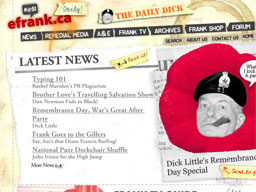The Ballad of Electronic Frank
Barely a month after its relaunch in September, Frank magazine was hit with its first libel suit. A “monstrous libel” suit, in fact, according to claimant Pamela Wallin. Many publishers might break into a cold sweat at such a thought, but not Frank publisher Michael Bate. “It’s just like the old days,” he says. “Now it’s official. We’re back.”
Frank folded last December after 15 years of spreading rumour, gossip and satire about politicians and journalists alike. Circulation had been dropping steadily for years, and it accelerated when Bate, who had been with Frank since 1989, sold it to former ROB reporter Fabrice Taylor in 2003. Taylor’s attempts to reduce this trend only succeeded in killing Frank in just over a year.
Bate initially resurrected the magazine online as eFrank, a subscriber-only publication, but now plans to launch a print edition as soon as he can. “It’ll be the lowest grade paper possible,” Bate says. “You’ll get splinters when you turn pages.” Starting from scratch is no easy task, especially for a magazine that doesn’t believe in marketing or advertising, and one whose readership abandoned it in its last incarnation. Bate doesn’t quite know how to pull it off. “If anybody’s got any ideas, I’m all ears.”
Still, Bate is almost thankful the magazine bombed under Taylor. “He paved the way for it to come back,” Bate says. “It would have been great if he had pulled it off, but then I wouldn’t be here now doing what I really enjoy.” Taylor also showed Bate how not to run Frank.
Bate and Taylor initially attempted to work together, but Bate split a few weeks after the first issue. Not only did they disagree in terms of magazine content, which Taylor attempted to change, but they differed in management styles as well. “I was trying to explain to him why I work from home,” Bate says, “and he wanted to get a web cam for me to make sure people were at their desks. I don’t care where they are, so long as they’re delivering.”
Frank had built its reputation on providing unverified, un-sourced political and journalistic gossip from Ottawa. At its best, Frank served as a watchdog, printing stories mainstream media could not. If it had something particularly juicy, other media would run with it, sometimes with great success. It was Frank, for example, that first revealed former defence minister Art Eggleton issued a government contract to a former girlfriend. Taylor reduced this element in favour of more humour and double-sourced articles with greater emphasis on Bay Street.
Taylor didn’t return calls for this article, which is unfortunate because it’s hard to find anyone with anything nice to say about his tenure. At worst, he produced a “steaming turd” of a magazine. At best, he was merely “unfunny,” says Steve Collins.
Collins worked for Frank on and off since 1996, including a stint under Taylor before being fired last year – or “gratefully thrown clear,” as he claims. Taylor’s biggest mistake, Collins says, was trying to turn Frank into a more credible publication. Stories were to be more balanced, facts double-sourced, and there was to be less reliance on anonymous sources – standard practice for most publications, but not Frank. It’s nearly impossible to verify the kind of salacious rumours it runs, and to have sources speak on the record. After all, who would want to admit to tipping off Frank about some of our elected officials’ liberal consumption of alcohol?
Any Frank editor will say getting information wrong is an unavoidable hazard of this kind of journalism. So while its articles may have become more credible under Taylor, they became less interesting for readers. Circulation was around 7,500 when Taylor bought it in August 2003; by November 2004, it had plummeted to 2,500. It got to the point where, Collin says, “We’d pretty much given up on trying to do anything good.”
Among those who stopped reading was Ottawa Citizen columnist David Ljunggren, even though he believes Taylor was on to something in terms of verification. “Frank‘s reliability is always diluted by this question of, ‘Is it true or not?'” he says. “If they took a little more care to verify the stuff that’s coming in, it could be much more useful.”
But Bate watched Taylor crash and burn, and isn’t about to tinker with Frank‘s traditional style too much. Anonymous sources and byline-less articles abound in the online version. Another highly criticized element, the magazine’s penchant for tasteless, frat-boy humour, is still a part of Bate’s Frank. There’s even a new venue for it: Frank TV, which features short, satirical videos. Currently, the site is playing up “There’s Something About Belinda,” in which Ken and Barbie dolls representing Bill Clinton and Belinda Stronach engage in anatomically incorrect sex.
Re-jigging Frank‘s content wasn’t a priority for Bate – figuring out how to launch online was enough of a problem. Bate made a rookie mistake by assuming Frank could publish only once a week, but he quickly realized the rapid pace of Internet news made it necessary to switch to a daily model. It’s more work, more hectic, and the pace allows for less perspective on stories. “We may be as dumb as the dailies now,” Collins jokes, who returned to Frank when it re-launched.
Former Frank staffer Glen McGregor, now at the Ottawa Citizen, thinks that while Frank may run interesting stories, the articles lack immediacy online. “When it was in print form, it didn’t seem to matter so much when you read it. But on the Internet, you want things that are instantaneous, and I don’t think it really lends itself too well to that.”
However, going daily means Frank employees no longer have to live in fear for a week wondering if they’ll be scooped by a daily newspaper – if they have stories worthy of scooping, that is. Ljunggren, at the Citizen, hasn’t heard anyone talk about stories from Frank. Neither has Toronto Star Ottawa bureau chief Susan Delacourt. So far, aside from Wallin’s libel suit and a blurb in the Star from an upset National Hockey League representative grumbling about a video piece satirizing an NHL commercial, Frank has been pretty quiet since its return.
Part of the problem is simply getting the word out. Weeks after launching, Bate has had friends ask him when Frank is coming back. The old print edition, while never a huge newsstand success, was highly circulated from person to person, both within newsrooms and the halls of Parliament. The online subscription model makes this much more difficult. Bate isn’t worried it will affect the magazine, confident that those interested enough will pay. In fact, the site was designed to make it difficult to cut and paste stories, limiting how widely they can spread online. “This is not an altruistic endeavour,” Bate says. “I want to prove this is a sound business model, and will not lose money like every other magazine in Canada.”
Frank currently has 800 subscribers paying $9.95 a month, and needs 2,500 to break even. Simply subscribing presents its own concerns for readers. Because of its reputation, many potential readers are worried about being seen with the magazine for fear of being pegged as an informant. Buying it on the newsstand was tricky enough, Ljunggren says. “I remember going to the store, looking around suspiciously, buying Frank and stuffing it in my pocket and running back to the office to see if I’d been featured in it,” he says.
Online subscription doesn’t allow that anonymity. “I probably share other people’s reservations that if you subscribe to Frank, they’ll probably print the list of subscribers at some point,” says Susan Delacourt. Frank had to include a disclaimer in the old print edition stating it would not sell its subscriber list, and Bate insists he would never reveal the list for the website.
Still, Bate took all of this into consideration during the past few weeks and decided it would be wise to run a print edition again. “I’m not concerned about the medium of Frank. We want it to go out to as many people as possible,” Bate says. The plan is publish biweekly, compiling the best articles from the website. Bate doesn’t know what kind of circulation Frank will have in its initial run, and isn’t planning a marketing campaign for its release either. “We’ll probably just show up on the newsstand one day,” Collins says.
Although Ljunggren has been featured in Frank, once for something he says he didn’t do (throwing a hissy fit after being improperly credited for his articles), he’s still looking forward to Frank‘s return to print. “Ottawa has suffered from the lack of Frank because no one really knows what’s going on across government,” he says. “So I’ll happily – and anonymously – buy the first issue.”















